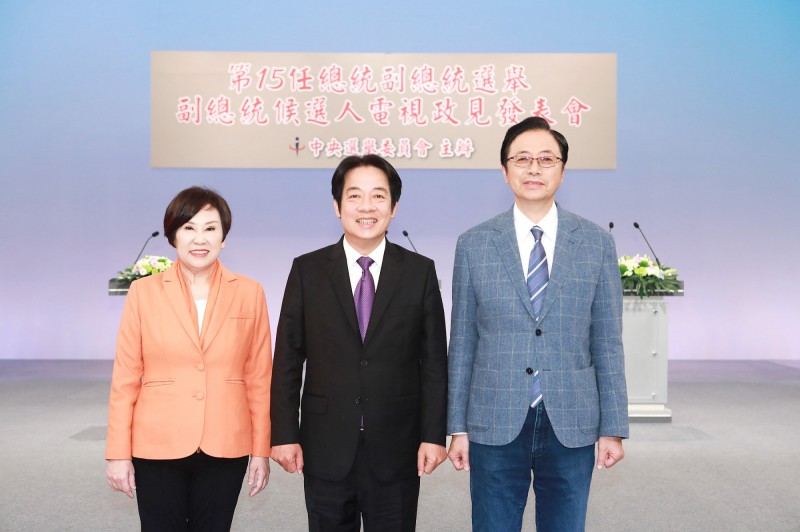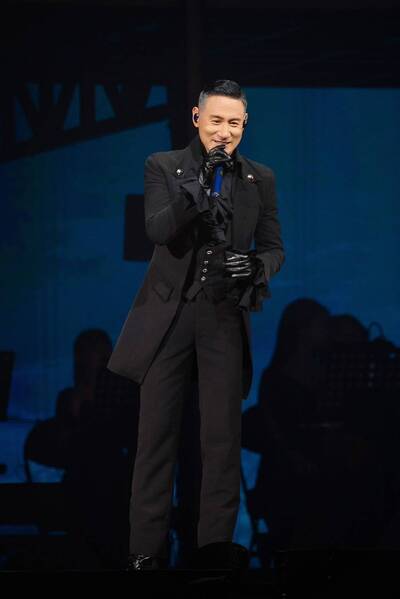《TAIPEI TIMES》 VP candidates present their platforms

From left, former United Communications Group chairwoman Sandra Yu of the People First Party, former premier William Lai of the Democratic Progressive Party and former premier Simon Chang of the Chinese Nationalist Party (KMT) pose in a Public Television Service studio in Taipei yesterday ahead of their vice presidential platform presentations. Photo courtesy of Central Election Commission via CNA
DIFFERENT APPROACHES: Chang panned DPP policy and Yu called for controversial legislation to be shelved, while Lai touted the DPP’s strategic plans for development
By Lee Hsin-fang and Dennis Xie / Staff reporter, with staff writer and CNA
The three aspiring vice presidents yesterday presented their campaign platforms at the first and only televised vice presidential policy presentation hosted by the Central Election Commission (CEC).
Like the first televised presidential presentation on Wednesday, last night’s event was conducted in three rounds, with each candidate given 10 minutes per round.
The order of presentation was decided by drawing lots, with former premier Simon Chang (張善政) of the Chinese Nationalist Party (KMT) going first, followed by former premier William Lai (賴清德) of the Democratic Progressive Party (DPP) and former United Communications Group chairwoman Sandra Yu (余湘) of the People First Party (PFP).
Lai and Chang are experienced politicians, while Yu, dubbed the “advertisement godmother” of Taiwan by the media, is new to politics.
Chang described a DPP digital entrepreneurship plan as a “deviant” policy that “kicks young people [out of Taiwan]” and touted “10 major digital action plans” he and his running mate, Kaohsiung Mayor Han Kuo-yu (韓國瑜), have proposed that would include establishing a digital innovation committee as part of the Executive Yuan to promote digital education and the development of smart cities.
The DPP government has lied to voters by embellishing statistics, he said.
He initially hoped that President Tsai Ing-wen (蔡英文) would lead the nation to a better future, but over the past two years he has seen the Tsai administration’s incompetence polarize the Taiwanese public, Chang said, adding that he finds it intolerable because of its blatant cronyism and nepotism.
A major reason he is running is that he hopes to establish a new environment for Taiwan, he said.
Digital technology is the key to economic transformation and ensuring people’s welfare, but the Tsai administration has failed to foster the development of innovative technologies, he added.
Lai said that “DPP” is not only an acronym for the party, but also for “democracy, peace and prosperity,” which are critical to the nation’s development.
He emphasized the importance of maintaining Taiwan’s democracy, cross-strait peace and economic prosperity.
Taiwanese love peace, but China has continued to threaten Taiwan with its military power and poaching of diplomatic allies, Lai said.
The KMT hopes to resolve issues with China through a peace deal, which would compromise Taiwan’s democracy, he said, adding that Taiwanese must stand united against China, which he described as a “bad neighbor.”
Tsai has made great strides in economic development and by 2030 Taiwan could become a “smart country,” where smart technology is incorporated into finance, education, healthcare, agriculture and manufacturing, he said, pledging to promote language education policies to turn Taiwan into a bilingual nation.
Yu said that at Wednesday’s presidential presentation, the DPP and KMT once against performed “a wonderful act filled with confusing statistics and political mudslinging, but no actual policies were presented.”
The nation’s two largest parties have gone to great lengths to marginalize the PFP, because it is the only party that accurately represents public opinion, Yu said, adding that the DPP has turned a blind eye to the pain and suffering of society over the past four years and its so-called reforms have been nothing but political purges against the KMT.
Yu described a DPP-proposed anti-infiltration bill as “a highly controversial, unthorough bill that tears apart and polarizes people,” urging the ruling party to halt discussion of the bill until the presidential and legislative elections on Jan. 11.
She pledged better care for veterans and older farmers; to review pension reforms for military personnel, public servants and public schoolteachers; and to increase social housing for young people and the elderly to better implement housing justice.
新聞來源:TAIPEI TIMES



















